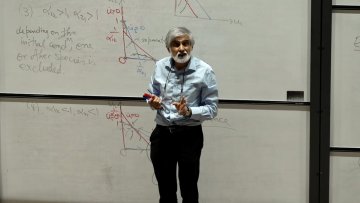14:15
On the Geometric Langlands Program
Abstract
I will discuss how some ideas from Geometric Langlands can be used to obtain new results in birational geometry and on the topology of algebraic varieties.
14:15
Machine learning detects terminal singularities
Abstract
In this talk, I will describe recent work in the application of machine learning to explore questions in algebraic geometry, specifically in the context of the study of Q-Fano varieties. These are Q-factorial terminal Fano varieties, and they are the key players in the Minimal Model Program. In this work, we ask and answer if machine learning can determine if a toric Fano variety has terminal singularities. We build a high-accuracy neural network that detects this, which has two consequences. Firstly, it inspires the formulation and proof of a new global, combinatorial criterion to determine if a toric variety of Picard rank two has terminal singularities. Secondly, the machine learning model is used directly to give the first sketch of the landscape of Q-Fano varieties in dimension eight. This is joint work with Tom Coates and Al Kasprzyk.
11:00
Probabilistic Schwarzian Field Theory
Abstract
Schwarzian Theory is a quantum field theory which has attracted a lot of attention in the physics literature in the context of two-dimensional quantum gravity, black holes and AdS/CFT correspondence. It is predicted to be universal and arise in many systems with emerging conformal symmetry, most notably in Sachdev--Ye--Kitaev random matrix model and Jackie--Teitelboim gravity.
In this talk we will discuss our recent progress on developing rigorous mathematical foundations of the Schwarzian Field Theory, including rigorous construction of the corresponding measure, calculation of both the partition function and a natural class of correlation functions, and a large deviation principle.


